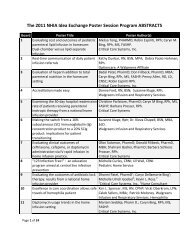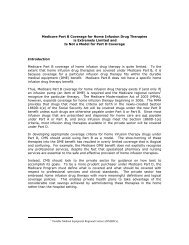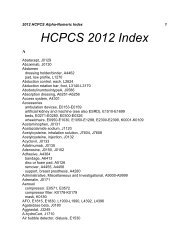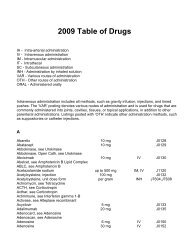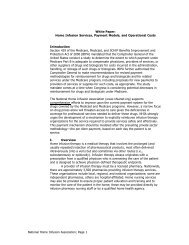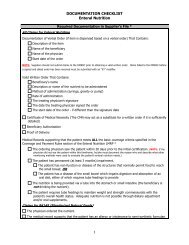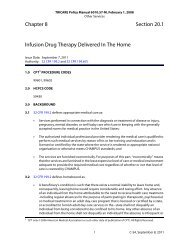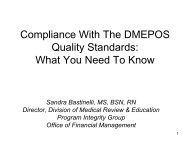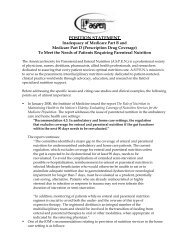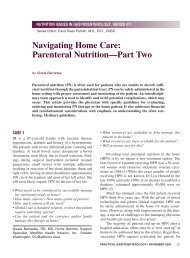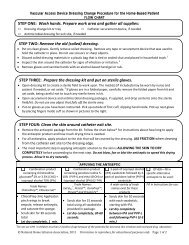Kaiser Family Foundation Survey on State Medicaid Managed Care ...
Kaiser Family Foundation Survey on State Medicaid Managed Care ...
Kaiser Family Foundation Survey on State Medicaid Managed Care ...
- No tags were found...
Create successful ePaper yourself
Turn your PDF publications into a flip-book with our unique Google optimized e-Paper software.
CAHPS© surveys. North Carolina is the <strong>on</strong>ly state that indicated that it plans to submit the results ofits upcoming CAHPS© survey for its PCCM program to NCQA.• PHP performance measurement. Thirteen of the 25 states with n<strong>on</strong>-comprehensive PHPs reportedthat they assess quality and performance in these plans using HEDIS© or similar state-specificmeasures. <strong>State</strong>s tailor the measures they use to corresp<strong>on</strong>d to the limited benefits provided bythese plans. Thus, because the most comm<strong>on</strong> PHPs are plans providing behavioral health services,typical performance measures relate to access to and timeliness of routine appointments forbehavioral health care, coordinati<strong>on</strong> of behavioral and physical health services, and follow-up careafter hospitalizati<strong>on</strong> for mental illness. Not surprisingly, most states use fewer measures for n<strong>on</strong>comprehensivePHPs than for either MCOs or PCCM programs. Only three states reported usingCAHPS© for their PHPs (Ariz<strong>on</strong>a, Colorado, and DC).Close to a third of states also measure quality in the FFS comp<strong>on</strong>ents of their <strong>Medicaid</strong> programs.Sixteen states reported using HEDIS© measures in FFS. The number of measures varies widely, from alow of 10 or fewer in three states (Ohio, Louisiana, and Wyoming), to a high of 25 or more in threestates (Kansas, Maine, and South Carolina). In additi<strong>on</strong> to providing states with informati<strong>on</strong> <strong>on</strong> accessand quality in FFS, FFS data can also provide a useful benchmark for comparis<strong>on</strong> to managed careperformance in states that have MCOs and/or a PCCM program. In additi<strong>on</strong> to HEDIS© measures, sevenstates reported using state-specific measures for FFS, usually the same <strong>on</strong>es added to assess managedcare, or representing areas of high policy priority, such as access to well-child care and dental care. Eightstates reported that they c<strong>on</strong>duct the CAHPS© survey or a similar survey of patient experience in FFS atthe same time they administer the survey am<strong>on</strong>g managed care enrollees (Colorado, Kansas, Maine,Michigan, Oreg<strong>on</strong>, South Carolina, Virginia, and Washingt<strong>on</strong>).Three-fourths of states with MCOs publicly report <strong>on</strong> the quality of their MCOs, and half of states withPCCM programs publish quality reports <strong>on</strong> those programs. The data collected by states and healthplans provide rich informati<strong>on</strong> about how well <strong>Medicaid</strong> systems of care are performing, how providersand plans compare in their effectiveness, whether patients can access care when they need it, and areaswhere there is room for improvement. This informati<strong>on</strong> supports state value-based purchasing effortsand can help states structure payment to advance quality goals. Also, <strong>on</strong> the principle that transparencyregarding performance will drive improvement in quality, states also provide data <strong>on</strong> performance toproviders, plans, beneficiaries, the public, and policymakers.Thirty-five states reported that they publicly release reports <strong>on</strong> MCO and/or PCCM quality performance,most often by posting the report <strong>on</strong> the <strong>Medicaid</strong> program’s website. Most states also provide thereports back to providers and health plans that submitted the data, while others provide the reports totheir legislature. Three states do not publish quality reports, but make the informati<strong>on</strong> available up<strong>on</strong>request. The total of 38 states that make quality informati<strong>on</strong> public includes 28 of the 36 states withMCOs, and 16 of the 31 states that operate PCCM programs. Two of the states reported that they firstmade quality reports public in FY 2011, an indicati<strong>on</strong> that public reporting of quality data may begrowing. Nine states also publicly report <strong>on</strong> PHPs’ performance, allowing a look at quality across allforms of managed care in those states. Further, six states extend quality performance reporting to then<strong>on</strong>-managed fee-for-service comp<strong>on</strong>ents of their <strong>Medicaid</strong> programs.A number of states prepare quality “report cards.” Fifteen states with MCOs and North Carolina, aPCCM-<strong>on</strong>ly state, reported that they prepare a quality report card, using HEDIS©, CAHPS©, and statespecificdata, that <strong>Medicaid</strong> beneficiaries can use to compare and choose health plans. For example, the37



